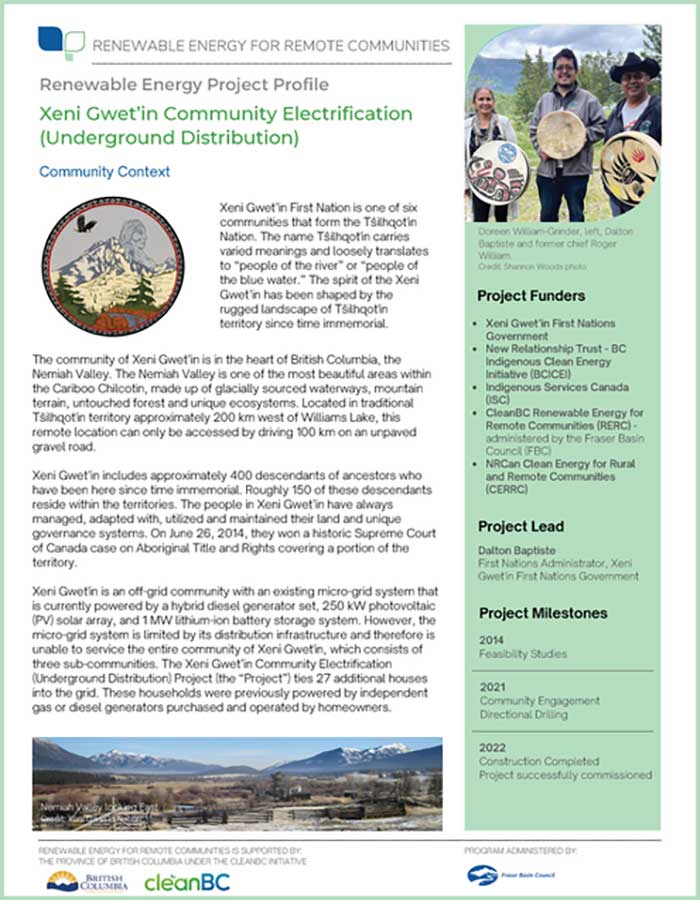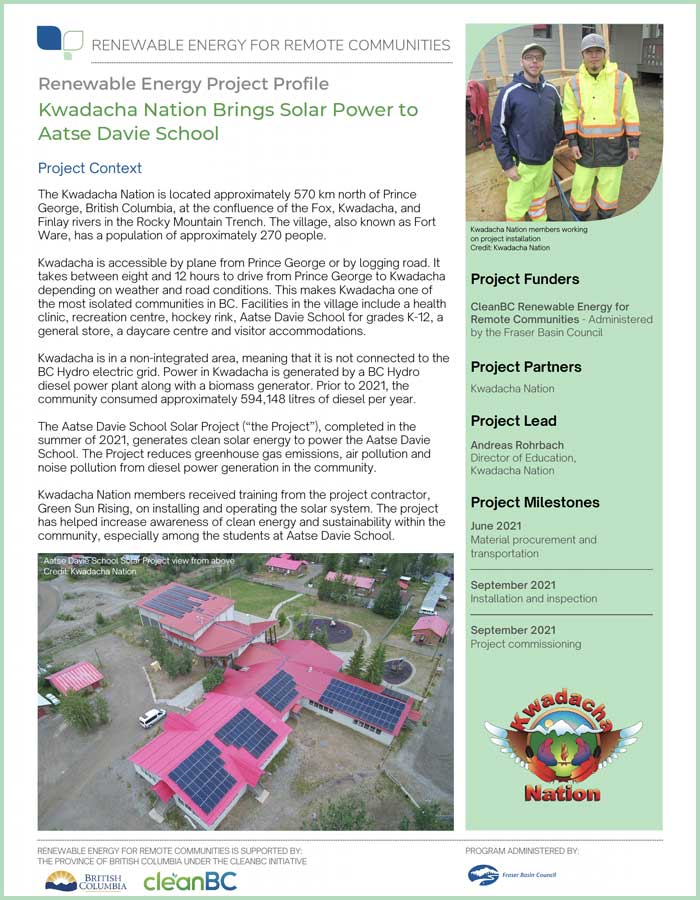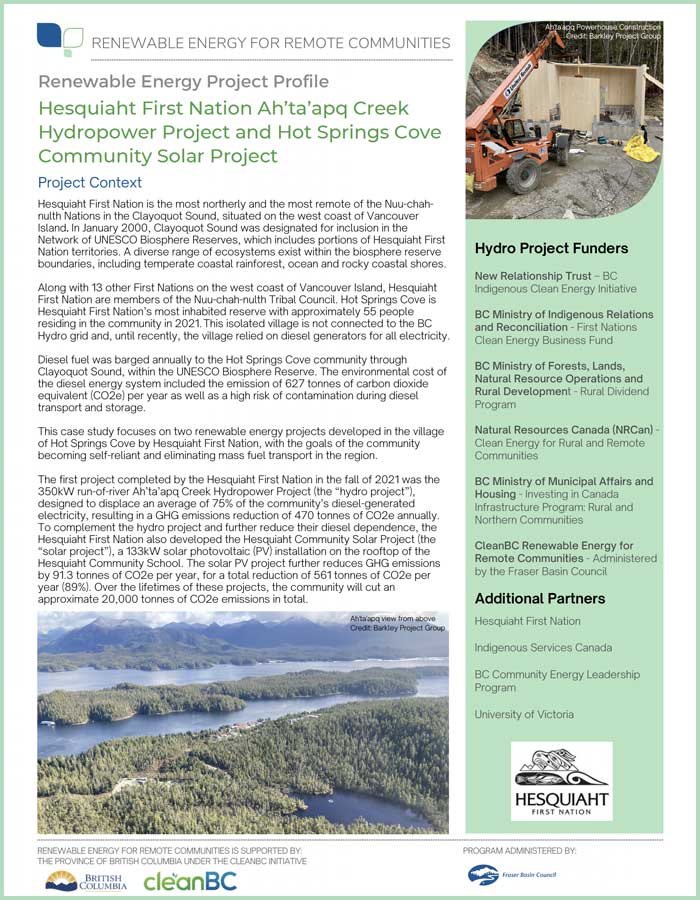Renewable Energy for Remote Communities
An initiative of CleanBC, the Renewable Energy for Remote Communities (RERC) Program has helped communities reduce their reliance on diesel by funding the capital costs of renewable electricity projects. RERC was designed to complement other programs that help remote communities in energy planning, increasing energy efficiency and decarbonizing energy systems.
There were two rounds of funding applications in 2020. Funding was announced for Hesquiaht First Nation, Xeni Gwet’in First Nation, Kwadacha First Nation and Lhoosk’uz Dené First Nation. Project profiles are rolling out, beginning in 2022, as the projects complete. Take a look at this inspirational work!
RERC is delivered by Coast Funds and the Fraser Basin Council under the CleanBC Plan.
Renewable Energy Project Profiles
Xeni Gwet’in Community Electrification
Xeni Gwet’in, a community in the remote Nemiah Valley, relies on a micro-grid system. The system is powered by a hybrid diesel generator set, 250 kW photovoltaic solar array and 1 MW a lithium-ion battery storage system. Power did not reach all community homes, however, until a recently completed project bridged that gap. This was done by laying an underground electrical distribution line to tie a more distant group of homes — previously powered by individual gas and diesel generators — into the micro-grid system.
In this Nation’s journey towards 100% renewable energy, this was an important milestone. It was also one designed to respect the aesthetic of the community’s beautiful and remote landscape.
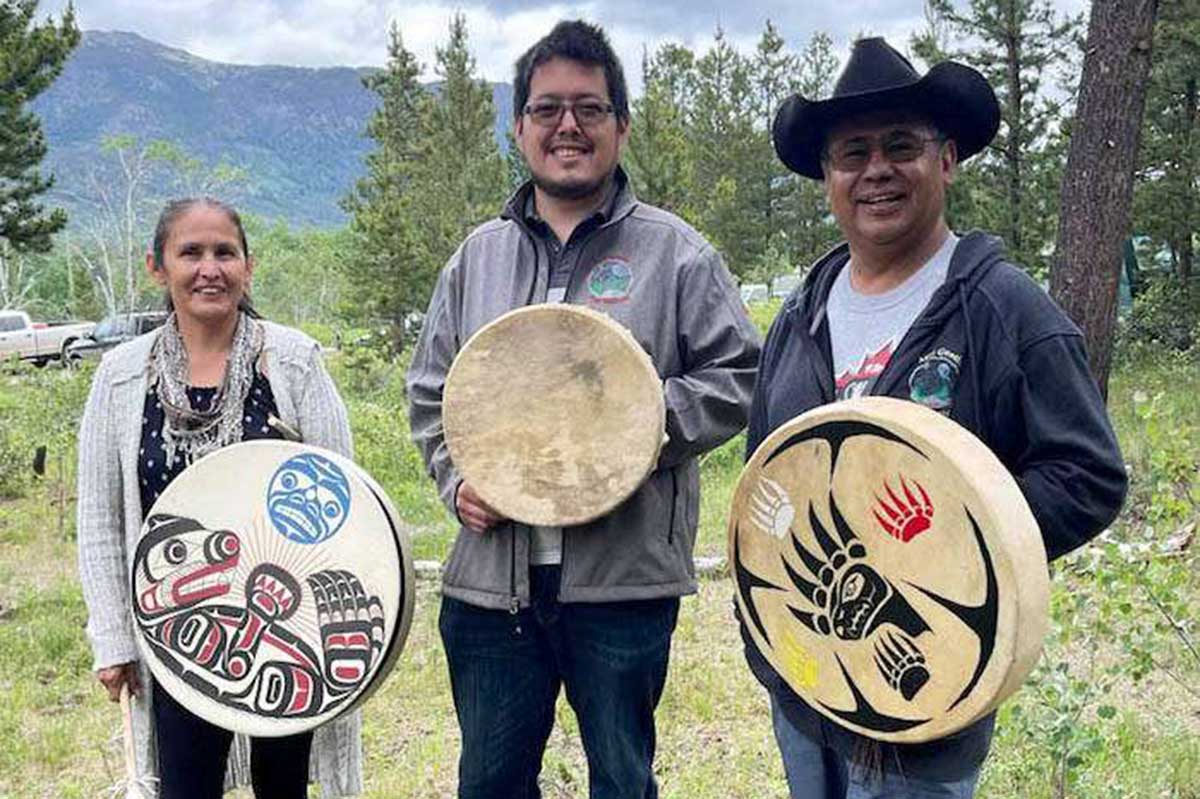
Doreen Grinder-William (left), Dalton Baptiste and former chief Roger William (right). Photo: Shannon Woods.
Kwadacha Nation Brings Solar Power to Aatse Davie School
Kwadacha First Nation is not connected to the BC Hydro electrical grid. The community is powered primarily through a diesel power plant along with a biomass generator. Prior to 2021, the community used approximately 594,148 litres of diesel per year. In the summer of 2021, the Nation completed work on a solar photovoltaic system on the rooftop of Aatse Davie School. The system now produces clean energy to directly power the school, which cuts fuel use and greenhouse gas emissions, and saves money. There are other important benefits too. This clean energy transition reduces air pollution and noise pollution from diesel power generation.
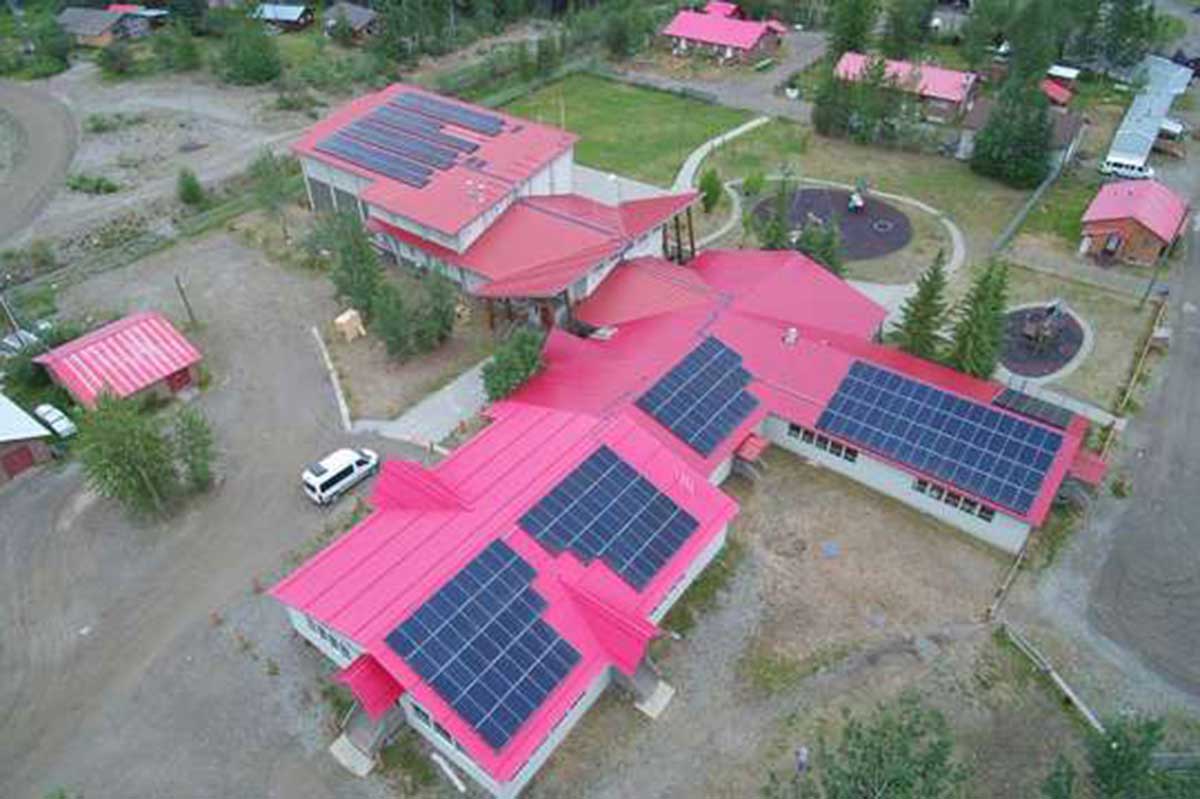
The Kwadacha Nation is about 570 km north of Prince George, one of the most isolated communities in BC. Its progressive work on renewable energy includes this solar panel project on its community school.
Hesquiaht First Nation — Ah’ta’apq Creek Hydropower Project and Hot Springs Cove Community Solar Project
Hesquiaht First Nation, on the west coast of Vancouver Island, is leading on local clean energy innovation. In 2021 the Nation launched a 350kW run-of-river Ah’ta’apq Creek Hydropower Project. This project was designed to displace an average of 75% of the community’s diesel-generated electricity and lower its greenhouse gas emissions. To complement the hydro project and further reduce diesel dependence, the Nation developed the Hesquiaht Community Solar Project, a 133kW solar photovoltaic (PV) installation on the rooftop of the Hesquiaht Community School. The project was also in the news in 2024!
Program Overview
Note: There are no further funding rounds planned at this time. This section is for information only.
The Renewable Energy for Remote Communities (RERC) Program was a key part of the CleanBC Remote Community Energy Strategy. The strategy targeted the largest diesel generating stations in BC and aimed to reduce province-wide diesel consumption for generating electricity in remote communities by 80% by 2030.
On behalf of the Province, Coast Funds and the Fraser Basin Council (FBC) were responsible for delivering up to $16.5 million to remote communities to develop renewable electricity projects. Coast Funds was responsible for delivering the RERC Program with First Nations located in the Great Bear Rainforest and Haida Gwaii regions. The Fraser Basin Council was responsible for delivering the RERC Program with all other remote communities in BC.
The program has supported renewable electricity projects by funding construction activities, such as engineering, contract labour, equipment for project construction, training costs, technology procurement and associated materials.
The goal of the program was to facilitate the displacement of diesel electricity generation by constructing renewable electricity generation projects that decarbonize remote energy systems, thereby enhancing social and economic resilience in remote communities that are diesel dependent.
Projects Funded
1st Intake: January to June 2020: The Fraser Basin Council allocated $5.9 million for Hesquiaht First Nation’s Ahtaapq Creek Hydropower Project (Province of BC media release) as well as $1.8 million for Xeni Gwet’in First Nation’s Underground Distribution Community Electrification Project (Province of BC media release) in the first intake for RERC funding.
2nd Intake: July to November 2020: The Renewable Energy for Remote Communities Program opened a second intake of applications for renewable energy project funding in July 2020. Funding for projects in three remote First Nations community was announced in spring 2021 under the CleanBC plan of the Province of BC, for Kwadacha First Nation, Hesquiaht First Nation and Lhoosk’uz Dené First Nation.
Quotes from Communities
“I’m excited about this opportunity. This project fits perfectly with Kwadacha’s vision of becoming energy self-sufficient in a green and sustainable way. Renewable energy is the way of the future. This project allows Kwadacha for the first time to see and use this technology. Having this project tied to the school will give the children of Kwadacha a better understanding of solar power and its possible uses in the future.”
— Darryl McCook, Chief, Kwadacha First Nation
“This announcement is part of our long journey towards sustainable energy production, which is key to preserving our rich biodiversity, clean air and pristine waters.”
— Joshua Charleson, Hesquiaht Chief Councillor
“Our territory has been heavily impacted by mountain pine beetle and several large wildfires. The combined heat and power generator will provide us with a viable option for alternative energy. We will be transitioning from diesel generators to utilizing local biomass fuels.”
— Liliane Squinas, Chief, Lhoosk’uz Dené First Nation
“Lhoosk’uz Dené, Kwadacha and Hesquiaht First Nations are moving forward with impressive new bioenergy and solar projects. They are showing how small communities can take big steps for sustainability and self-reliance by transitioning to energy sources that are cleaner and more reliable. It takes a strong vision to step into a new technology, especially in a remote location. By turning the vision into reality, they are proving practical energy solutions do exist ʹand that͛s encouraging for other small communities planning a change.”
— David Marshall, Chief Executive Officer, Fraser Basin Council
Top Banner Photo: The Hesquiaht Place of Learning in Hot Springs Cove is powered by Hesquiaht First Nation’s integrated 350kW hydro and 133kW solar PV hybrid system. The project has significantly reduced the community’s dependence on diesel for electricity generation. Photo: Barkley Project Group
Contact
For more information, contact the Program Lead for the RERC Program:
Erin Pedersen



